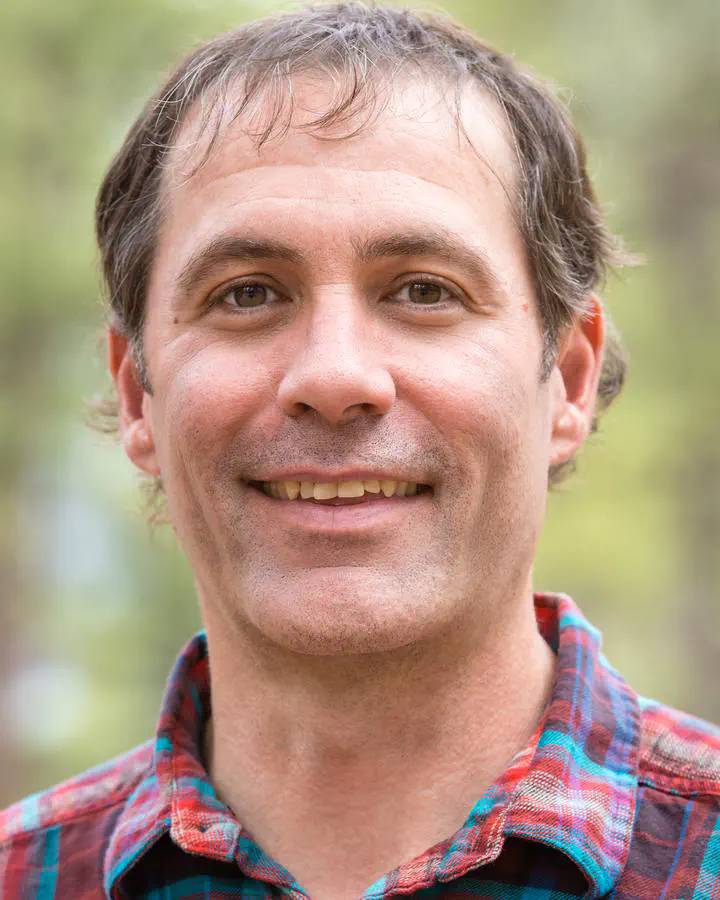Taylor Joyal
 Professor Taylor Joyal
Professor Taylor Joyal
About
Dr. Taylor Joyal is an Associate Teaching Professor in the School of Earth and Sustainability at Northern Arizona University, where he has been a faculty member since 2014. He specializes in fluvial geomorphology and watershed hydrology, with particular expertise in watershed processes, river system dynamics in arid and tropical climates, and post-wildfire flood impacts.
Research Interests
Fluvial Geomorphology
- River channel dynamics and morphology
- Sediment transport and deposition processes
- Channel evolution and adjustment mechanisms
- Fluvial response to environmental change
- Stream network analysis and characterization
Hydrology and Watershed Processes
- Watershed hydrology and water balance studies
- Surface water-groundwater interactions
- Hydrologic modeling and prediction
- Streamflow analysis and flood frequency
- Land use and climate impacts
- Watershed restoration and management
Post-wildfire Impacts
- Post-fire flood processes and hazards
- Debris flow initiation and runout
- Watershed recovery following wildfire
- Fire effects on hydrologic processes
- Post-fire erosion and sedimentation
- Seismic characterization of debris flows
Dam Removal and River Restoration
- Dam removal impacts on river systems
- Restoration ecology and geomorphology
- River connectivity and habitat restoration
Education
- Ph.D. Water Resources Science and Management
- M.S. Quaternary Sciences
- B.A. Geology — B.A. Anthropology
Professional Experience
Academic Positions
- Associate Teaching Professor, Northern Arizona University (2014-present)
- Research Associate, Alexander Fremier’s Lab
- Field Research Coordinator, Multiple watershed studies
- Collaborative Researcher, Regional restoration projects
Research Impact
Dr. Joyal has made significant contributions to fluvial geomorphology and hydrology with over 560 citations across 22+ publications. His work directly informs watershed management, restoration practice, and post-fire debris flow characterization.
Major Research Areas
Post-wildfire Flood Research
- Flood frequency and magnitude changes following wildfire
- Debris flow processes in burned watersheds
- Watershed recovery timescales and hydrologic response
- Risk assessment for post-fire flooding hazards
Dam Removal Studies
- Geomorphic response to dam removal projects
- Restoration success monitoring and assessment
Biocrust and Soil Surface Research
- Biocrust communities and watershed function
- Soil surface roughness effects on runoff and erosion
- Surface-subsurface flow interactions in arid environments
- Ecosystem service provision by biocrust communities
Teaching Excellence
Student Impact
Students consistently praise Dr. Joyal as:
- “One of the best professors at NAU” - Exceptional teaching recognition
- “Very knowledgeable” - Deep expertise in geomorphology and hydrology
- “Explains things clearly” - Effective communication of complex concepts
- “Passionate about his field” - Inspiring approach to earth sciences
Course Development
- Environmental Science - Interdisciplinary environmental systems
- Geomorphology - Landform processes and evolution
- Hydrology - Surface water processes and management
- Field Methods - Hands-on watershed and stream assessment
Innovative Pedagogy
- Field-based learning experiences in local watersheds
- Hands-on data collection and analysis training
- Real-world applications of geomorphological principles
- Integration of research with undergraduate education
- Problem-based learning approaches to environmental challenges
Research Collaborations
Laboratory Affiliations
- Alexander Fremier’s Lab - Collaborative research in restoration ecology
- Watershed research networks - Regional and national partnerships
- Post-fire research groups - Interdisciplinary wildfire impact studies
Field Research Sites
- Southwestern United States watersheds and river systems
- Watershed Hydrology and Land Use plus Climate Change impacts central highlands of Costa Rica
- Post-fire study areas in fire-prone regions of western US
- Restoration project locations for long-term monitoring
Professional Service
Review and Advisory Activities
- Peer reviewer for hydrology and geomorphology journals
- Grant review panels for watershed restoration funding
- Conference session organizer for fluvial geomorphology meetings
- Restoration project advisor for agencies and NGOs
Professional Organizations
- American Geophysical Union - Hydrology and earth surface processes
- Geological Society of America - Quaternary geology and geomorphology
- Society for Freshwater Science - Stream ecology and restoration
- Association of American Geographers - Physical geography and water resources
Current Research Focus
Dr. Joyal’s ongoing research emphasizes:
- Climate change and land use impacts on watershed hydrology and geomorphology
- Restoration effectiveness monitoring and assessment
- Post-fire recovery processes and management strategies
- Student research opportunities in applied hydrology
- Community engagement in watershed management
Applied Research Applications
Watershed Management
- Post-fire flood risk monitoring, assessment and mitigation
- Stream restoration design and implementation
- Water resource management in changing environments
Restoration Practice
- Evidence-based restoration approaches and techniques
- Monitoring protocols for restoration success
- Adaptive management strategies for restoration projects
- Stakeholder engagement in restoration planning
Research Philosophy
Dr. Joyal’s approach emphasizes the integration of fundamental geomorphological and hydrological principles with practical applications for watershed management and restoration. His work demonstrates the importance of long-term monitoring and adaptive management in addressing complex environmental challenges, particularly in arid and humid tropical climates.
Future Directions
Dr. Joyal continues to advance:
- Climate adaptation strategies for watershed management
- Next-generation restoration techniques and assessment
- Student training in applied hydrology and geomorphology
- Community-based research partnerships
- Integration of traditional and scientific knowledge in watershed management
Community Engagement
Dr. Joyal’s work directly supports:
- Local watershed groups and restoration organizations
- Land management agencies in restoration planning
- Emergency management for post-fire flood preparedness
- Educational outreach on watershed processes and management
- Policy development for watershed protection and restoration
Legacy and Impact
Dr. Joyal’s career represents excellent integration of research and teaching in applied geomorphology and hydrology. His work has significantly contributed to understanding watershed processes while providing exceptional educational experiences for students pursuing careers in earth and environmental sciences.